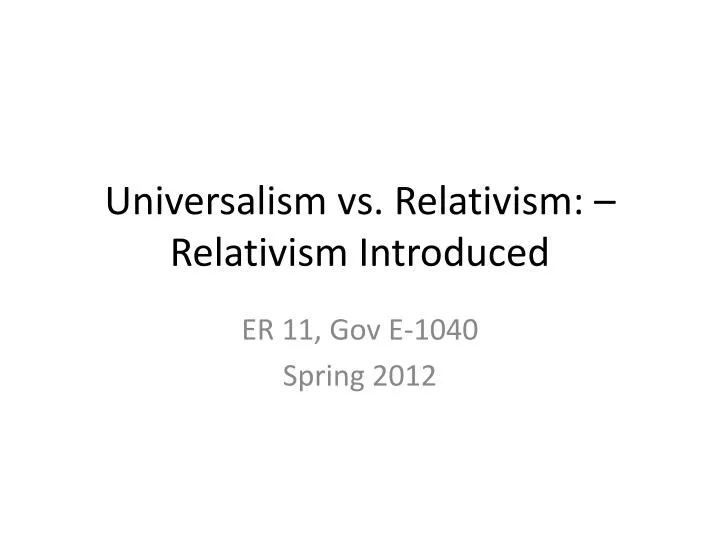In the vast landscape of philosophical discourse, the dichotomy of universalism and relativism emerges as a compelling conundrum. The interplay between these two paradigms has shaped diverse fields, including ethics, cultural studies, and international relations. As we traverse this intricate terrain, we unravel the essence of each viewpoint and their implications.
Universalism posits that there exist certain truths and moral principles that are universally applicable, transcending cultural and individual differences. It is akin to claiming that the sun rises in the east—an immutable fact regardless of one’s cultural context. This perspective argues for an inherent set of values that unite humanity, suggesting that across the mosaic of cultures, certain ethical standards remain constant. Consider, for instance, the foundational human rights principles recognized globally, such as the right to life and liberty. Universalism serves as a collective compass, guiding societies toward a common ethical destination.
In stark contrast lies relativism, a philosophical stance that posits that beliefs and values are inextricably tied to contextual factors, such as culture, history, and personal experience. This viewpoint acknowledges the kaleidoscope of human experience and understands that truth can be as varied as the cultures that espouse them. Relativism suggests that moral standards can shift; what is deemed virtuous in one society may be considered taboo in another. This fluidity resembles a chameleon adapting its hues, seamlessly integrating into the environment, illustrating that perspectives are diverse and often incommensurable.
Central to the discourse on these two philosophies is the question of moral authority. Universalists often argue for a singular, objective standard of morality. They advocate for the promotion of what they consider universally valid norms, attacking injustices such as oppression and discrimination. From this vantage, universalism can be seen as a bridge, intending to concatenate disparate cultures under a shared ethical umbrella.
Conversely, relativists critique this imposition of universal standards as inherently ethnocentric. They warn against a monolithic viewpoint that can lead to cultural imperialism—a scenario where one culture’s values are imposed upon another, disregarding their unique context. The relativist viewpoint asserts that understanding arises from recognizing each culture’s specific narratives and lived experiences. It challenges the notion that there is one way to live, love, or believe, emphasizing that meaning and morality are contingent upon the tapestry of social constructs.
However, the debate does not merely delineate two opposing sides; it invites more nuanced reflections. Can universalism truly exist without the risk of diminishing cultural specificity? Likewise, can relativism provide a robust framework for addressing global challenges, considering it may struggle to tackle issues that impact humanity at large? This crossroads leads to the exploration of potential syntheses of universalism and relativism.
One potential synthesis is that of “contextual universalism,” which seeks to acknowledge universal principles while respecting the contextual intricacies of different cultures. This approach recognizes common humanity but underlines the necessity of contextual interpretation. For instance, while the right to education is a universal premise, its implementation—what it looks like in practice—can vary greatly across societies. This synthesis advocates for a framework wherein global standards serve as guiding stars, yet the course plotted by individual cultures is thoughtfully acknowledged and validated.
Furthermore, the discourse invites us to ponder the implications of each philosophy on societal practices and international policy. In the realm of global governance, universalism often finds expression in international treaties and organizations that seek to uphold human rights. The Universal Declaration of Human Rights stands as a testament to the pursuit of collective moral standards aimed at fostering a peaceful coexistence.
On the other hand, relativism’s influence is seen in movements that demand cultural sensitivity in policy-making. Initiatives aimed at achieving environmental sustainability often benefit from a relativist perspective, understanding that indigenous practices and local knowledge systems can contribute significantly to ecological conservation. The beauty of biodiversity is mirrored by the cultural variety, where indigenous stewardship of the land reflects a profound appreciation of local customs and ecological nuances.
Ultimately, the discourse between universalism and relativism finds resonance in the way societies engage with and react to global challenges—CHALLENGES that transcend borders, such as climate change and humanitarian crises. Recognizing that a singular response may not suffice calls for a dance between asserting universal values while appreciating the cultural tapestries that shape responses across communities.
In conclusion, the dialogue surrounding universalism and relativism encapsulates more than mere philosophical nuances; it composes a vibrant narrative interwoven with ethical considerations, cultural appreciation, and a shared vision for a mutually beneficial existence. In navigating this terrain, one is reminded that neither approach holds absolute dominion—both are implicated in an ever-evolving discourse that reflects the complexity of human existence. As we gather insights from this discussion, we find ourselves tasked with bridging the gaps, advocating for a world where universal principles coalesce with respect for cultural diversity, crafting a harmonious space for dialogue, understanding, and collective action.
